We spied an interesting example of Facebook ads targeting recently which led us on a reverse-engineering investigation of a marketing funnel with a difference.
We had been on the HelloFresh website doing a little research for a client and got hit with a number of retargeting ads on Facebook as a result.
These two were pretty standard:
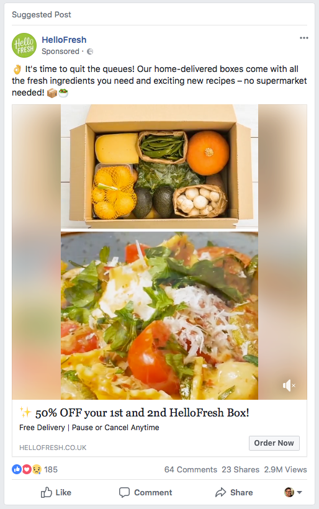
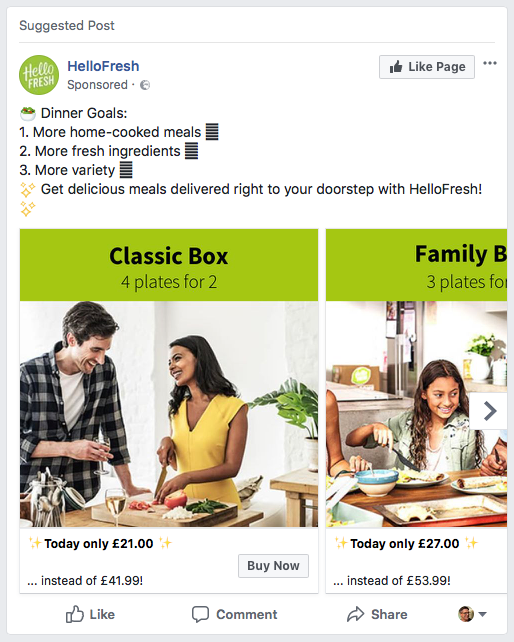
And sure enough, both were revealed as retargeting ads:
(Note: if you don’t know how to discover why you are being targeted on FB simply right click the three little dots at the top right of the ad, select ‘Why am I seeing this ad?’, and you’ll be shown the targeting criteria)
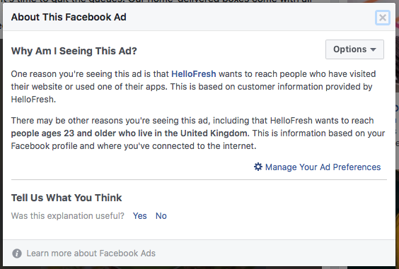
But then over the following days we started to see other ads about HelloFresh. But not posted by HelloFresh.
There was this one:
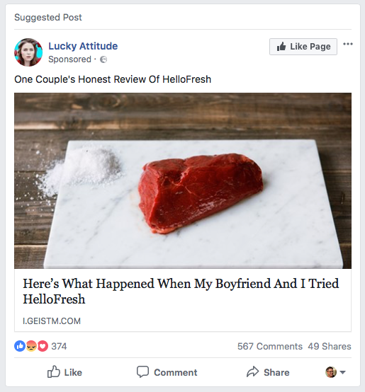
And this one:
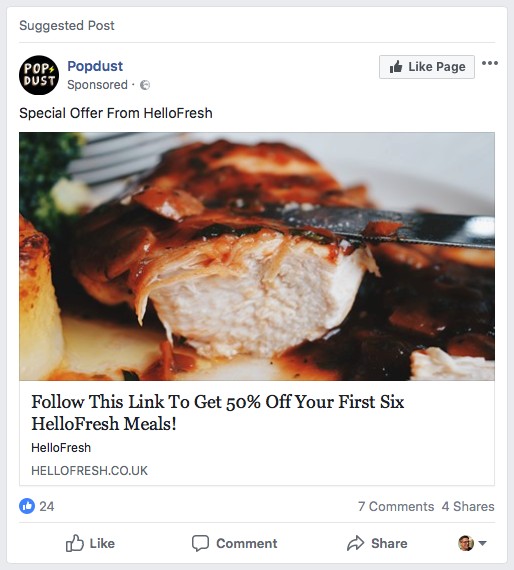
Now neither Carlton or I are fans of the Popdust or Lucky Attitude Facebook Pages. We have certainly never visited their websites and yet the ‘Why am I seeing this ad?’ criteria suggested that we had:
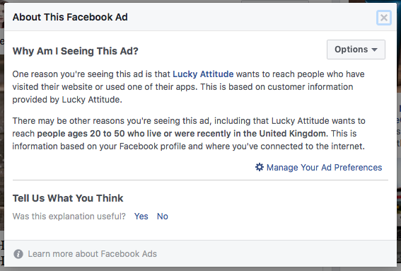
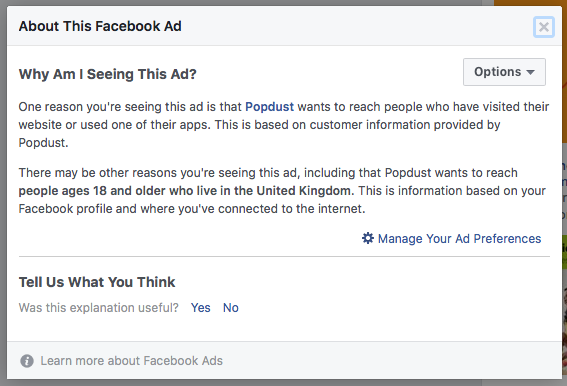
In an era where Facebook is being super cautious about data privacy this got us wondering what on earth was going on.
So with a little reverse-engineering we reckon we have it figured out.
When you click on the Lucky Attitude ad, the URL initially goes here to a tracking platform hosted by a marketing agency called GeistM. It is then quickly automatically redirected to Lucky Attitude’s actual blog content that is referred to in the ad. The Google Analytics UTM parameters appended to the link are quite revealing, with the Medium and Content values both referencing GeistM.
If you click on any of the HelloFresh links within the blog article on the Lucky Attitude website they go via the GeistM tracking platform again before quickly redirecting to HelloFresh – again with the GeistM and HelloFresh tracking parameters.
So what is going on and why?
HelloFresh (via GeistM, an agency working on their behalf) is sharing its Facebook pixel with Lucky Attitude and Popdust. That’s actually perfectly legal in Facebook terms and is easily done using Facebook Business Manager.
GeistM coordinates the entire activity of pixel sharing, creating ad campaigns, paying for the media and paying the publisher for clicks and/or conversions.
Rather than a straightforward affiliate arrangement (which was our first guess at what was happening), the publisher (Lucky Attitude) is, we believe, being paid simply for clicks to HelloFresh by GeistM. There may be a performance-based element in play too.
It’s an interesting form of influencer marketing. Here’s how we think it is working:
- GeistM identify influencers and/or appropriate content about one of their clients
- GeistM invite blogger/influencer to join their publishing network and be rewarded for clicks.
- GeistM add the publisher’s FB Page within their Business Manager so they can create (and pay) for ads that appear to be from the Page.
- GeistM have access to HelloFresh’s Facebook pixel data for website visits, and use this to target the ads.
- GeistM track the entire funnel and are paid either on performance or some other criteria. The blogger will be paid for clicks to the HelloFresh signup page from their blog article.
And GeistM have some pretty impressive clients: PayPal, LG, BarkBox, Bloomberg, Gillette and many more.
[Post publication note]
Since we wrote this article we were contacted by Tanya Korobka who works for Lucky Attitude (she was looking for a back link which we were happy to provide) and we asked about how the remuneration arrangement works. Tanya confirmed:
“Basically, there’s a one-off upfront placement fee + agreement that they send at least 3000 visitors to my site every day, which adds to my AdSense revenue.”
But shouldn’t it be labelled as Branded Content?
I think that maybe this really ought to be classified as branded content. I can see why it’s not – the apparent neutrality of Lucky Attitude and Popdust is perceived as a strong recommendation for HelloFresh which would be diluted if users thought they were being rewarded for it. Lucky Attitude and Popdust are acting as influencers. Influencers need to use the #spon hashtag on some platforms and on Facebook need to identify themselves as branded content when they receive payment for their endorsement or mention.
Here is Facebook’s definition of branded content:
“We define branded content as a creator or publisher’s content that features or is influenced by a business partner for an exchange of value. Our policies require creators and publishers to tag their business partners in their branded content posts.”
Here is an example of how branded content ads surface (I’ve cropped the top of the ad here). “Twisted *with* Quaker Oats UK”.
Twisted is the publisher/influencer and receiving payment from Quaker Oats for featuring their product in a piece of content.

Do you think the GeistM approach is genius? Or do you think they should be fessing-up to using branded content?
Are you an influencer working with GeistM? We’d love to hear how it works and whether we’re right or wrong with our detective work!
- Influencer marketing and Facebook pixel sharing: undercover advertising? - 11th May 2018
- [Opinion] Wetherspoon deletes all social media - 16th April 2018
- Our Facebook Group is closing to new members - 6th February 2018
- Why Facebook’s own advice on Group cover photo size is short-sighted - 30th November 2017
- Taking the Pulse – episode 3 - 11th May 2016
- Taking the Pulse – episode 2 - 3rd May 2016
